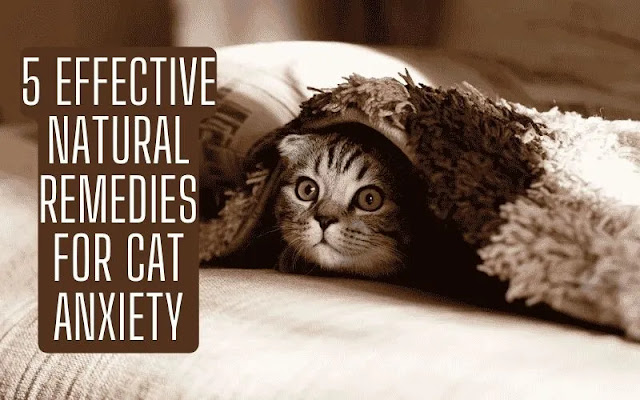Do you have a furry friend who is prone to anxiety? Cats can be easily stressed by changes in their environment, loud noises, or even when left alone for too long. Cat anxiety can manifest in various ways, such as excessive meowing, destructive behavior, or hiding.
As a responsible pet owner, you want to provide your cat with the best care possible. In this article, we’ll explore natural remedies for cat anxiety that can help alleviate your feline’s stress and promote a calm and happy environment for you and your pet.
Understanding Cat Anxiety
Before we dive into natural remedies for cat anxiety, let’s first understand what causes anxiety in cats. Like humans, cats can experience anxiety due to a variety of reasons, including:
- Changes in routine or environment
- Loud noises, such as thunderstorms or fireworks
- Separation from their owners or other pets
- The presence of other animals or strangers
- Medical conditions, such as hyperthyroidism or urinary tract infections.
Signs of cat anxiety
Signs of cat anxiety can include:
- Excessive meowing or vocalization
- Hiding or avoiding interaction
- Aggression or destructive behavior
- Urinating or defecating outside the litter box
- Loss of appetite
If your cat exhibits any of these behaviors, it’s essential to identify the underlying cause of their anxiety and address it accordingly. While medication may be necessary in severe cases, natural remedies for cat anxiety can be an effective first-line treatment for mild to moderate cases of feline anxiety.
Natural Remedies for Cat Anxiety
1. Create a Calm Environment
One of the easiest and most effective ways to alleviate cat anxiety is to create a calm and comfortable environment for your feline friend. This can be achieved by providing a safe space for your cat to retreat to, such as a cozy bed or a hiding spot.
In addition, you can use pheromone diffusers, such as Feliway, which emit calming scents that mimic the pheromones naturally produced by cats. These diffusers can help reduce your cat’s stress levels and promote a sense of calm and well-being.
2. Try Herbal Remedies
Several herbal remedies can help calm your anxious cat. These include:
- Valerian root: Valerian root is a natural sedative that can help alleviate anxiety and promote relaxation in cats. You can add a few drops of valerian root extract to your cat’s food or water or use a valerian-infused cat toy.
- Chamomile: Chamomile is a gentle sedative that can help calm your cat’s nerves. You can brew chamomile tea and mix it with your cat’s food or use a chamomile-infused cat toy.
- Catnip: Catnip is a natural herb that can have a calming effect on cats. You can offer your cat a catnip toy or sprinkle a small amount of dried catnip on their bedding.
3. Play with Your Cat
Playing with your cat is not only a great way to bond with them but can also help alleviate anxiety. Regular playtime can provide a healthy outlet for your cat’s energy and help reduce stress.
You can use interactive toys, such as wand toys or laser pointers, to engage your cat in play. It’s important to avoid overstimulating your cat, as this can increase their anxiety levels. A good rule of thumb is to have several short play sessions throughout the day rather than one long session.
4. Provide a Consistent Routine
Cats thrive on routine and familiarity, and disruptions to their routine can cause anxiety. Establishing a consistent cat routine can reduce stress levels and provide security.
Try to maintain a regular feeding schedule and provide a consistent environment for your cat by keeping their living space clean and tidy. You can also try calming music or white noise to create a peaceful atmosphere for your cat.
5. Consider Nutritional Supplements
Several nutritional supplements can help alleviate cat anxiety, such as:
a. L-tryptophan
L-tryptophan is an amino acid that can help promote relaxation and reduce anxiety in cats. It can be added to your cat’s food or supplement.
b. Omega-3 fatty acids
Omega-3 fatty acids have been shown to have a calming effect on cats and can help reduce anxiety. You can add omega-3 supplements to your cat’s food or feed them foods naturally rich in omega-3s, such as salmon.
c. CBD oil
CBD oil is a natural remedy that has gained popularity recently for its ability to reduce anxiety in humans and pets. However, it’s important to talk to your veterinarian before giving your cat CBD oil, as there is limited research on its safety and efficacy in cats.
Conclusion
Cat anxiety can be a challenging issue to deal with, but it can be managed effectively with the right approach.
By creating a calm environment, trying herbal remedies, playing with your cat, providing a consistent routine, and considering nutritional supplements, you can help alleviate your cat’s anxiety and promote a happy and healthy life for your feline friend.
Always talk to your veterinarian before trying new remedies or treatments for your cat’s anxiety. With patience, love, and a little effort, you can help your furry friend live their best life.
FAQs
What are some common signs that my cat is anxious?
Some common signs of anxiety in cats include excessive grooming, hiding, avoiding human contact, destructive behavior, excessive meowing or crying, and changes in appetite or sleeping habits.
How can I create a calm environment for my cat?
Creating a calm environment for your cat can involve calming music or white noise, providing a consistent routine, and ensuring your cat has a comfortable and clean living space.
Can I use over-the-counter remedies to treat my cat’s anxiety?
It’s important to talk to your veterinarian before trying any over-the-counter remedies for your cat’s anxiety, as they may not be safe or effective.
How long does it take for natural remedies to work on cat anxiety?
The effectiveness of natural remedies can vary depending on the individual cat and the severity of their anxiety. Some cats may respond quickly to remedies, while others may take longer to show improvement.
When should I consider using medication for my cat’s anxiety?
Medication for cat anxiety should only be considered under the guidance of a veterinarian and typically only in cases where natural remedies and behavioral modifications have not been effective. It’s important to weigh medication’s potential benefits and risks before making a decision.













Comments are closed.